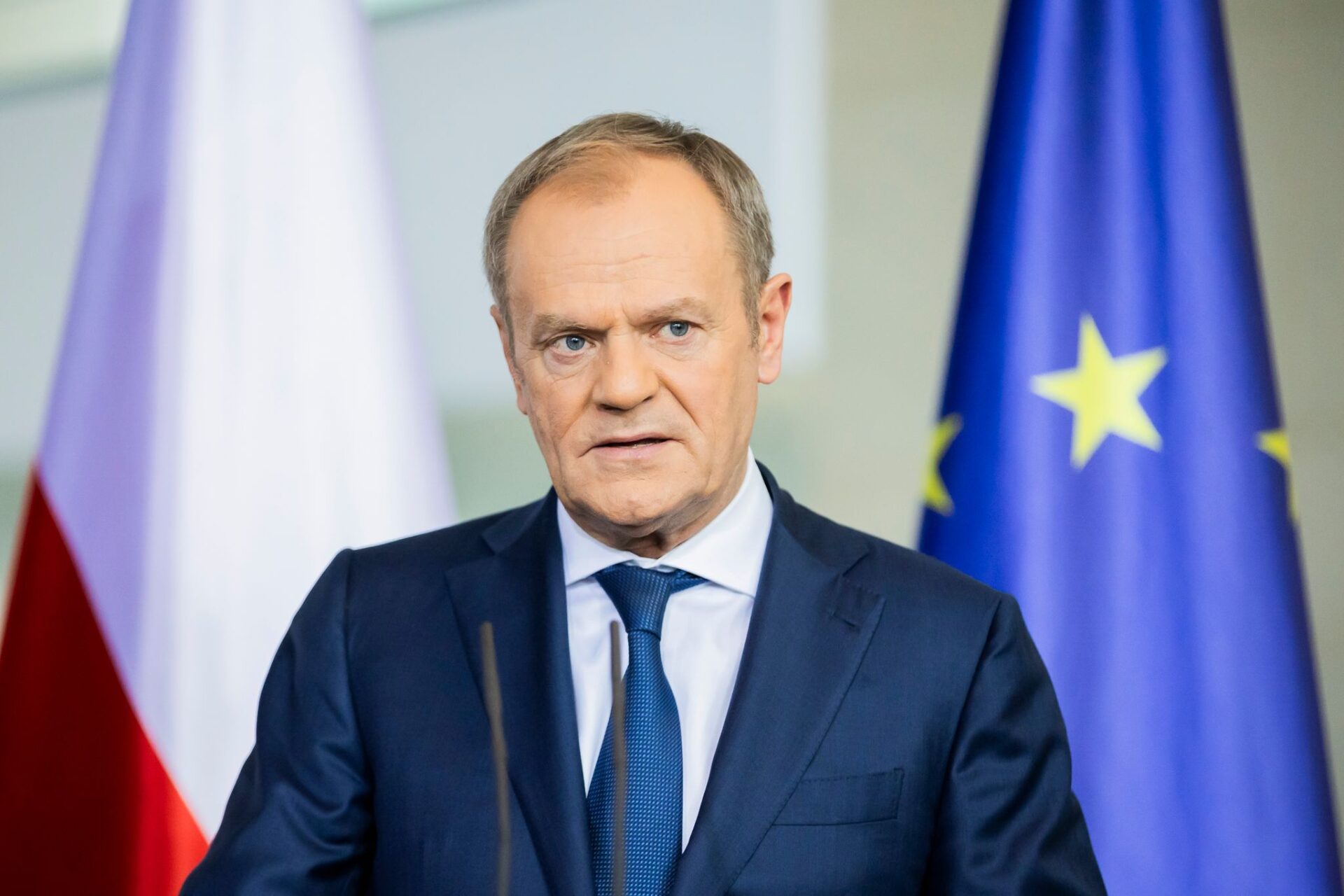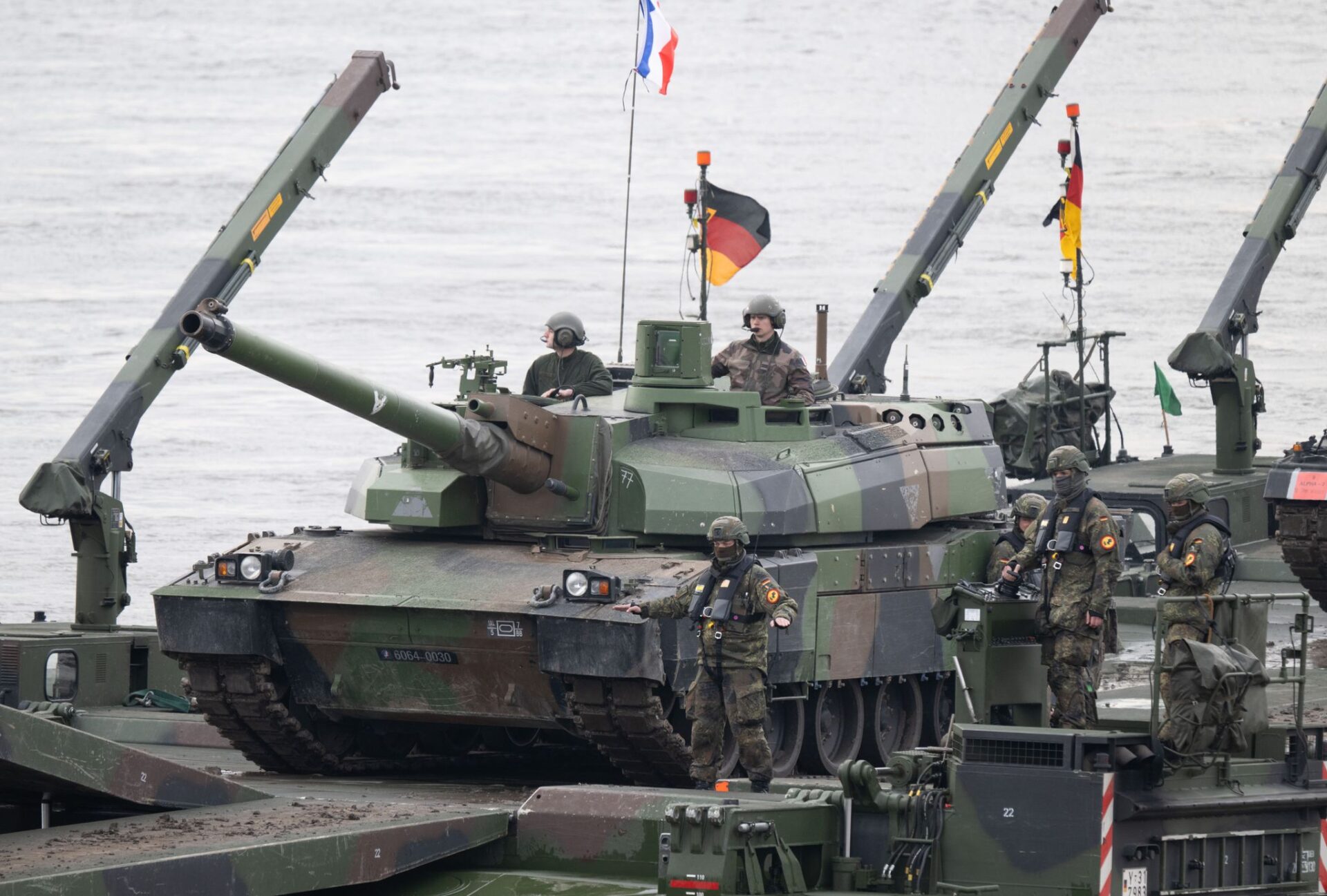 Have the article read by OpenAI (Beta). Please note that AI translations may take some time to process.
Have the article read by OpenAI (Beta). Please note that AI translations may take some time to process.“War is no longer a concept from the past, it is real,” Polish Prime Minister Donald Tusk warned in an interview with European media outlets last week. Just recently, on March 24, the Polish military had detected a violation of its airspace for a total time of 39 seconds by a Russian missile, after Polish airspace had already been violated at the end of December.
“The most worrying thing is that every scenario is possible. I know it sounds devastating, especially for the younger generation, but we have to get used to the fact that a new era has begun: the pre-war era,” Tusk said.
Kiev has warned its stocks of munitions are running low, as it is incessantly asking for patriots, ammunition, missiles and aircraft to defend itself against the Russian advance.
In an interview with the Financial Times, the presidents of Latvia and Estonia, Edgars Rinkēvičs and Alar Karis, urged the other European allies to do more to prepare for a possible armed confrontation with Russia, examining everything from conscription to a special defence tax and a significant increase in military spending.
In particular, for the Latvian head of state, European countries should discuss the return of compulsory military service in order to increase the number of defence forces. “It is necessary to seriously discuss conscription,” Rinkēvičs said, emphasising that armed forces across Europe have difficulties recruiting.
Another element is a return to the spending levels “of the Cold War era”. “Here, in this part of Europe and the world, we understand that we need to get to three percent,” Rinkēvičs explained to the British newspaper. Karis cited that the US accounts for 68 percent of all defence spending within NATO, 860 billion dollar last year compared to 404 billion dollar for European members and Canada. “We have to do something,” he warned, “at least make it 50-50.”
Tensions between Germany, France and Poland over how best to support Ukraine
“We stand together,” German Chancellor Olaf Scholz said on March 20 at a meeting with French President Emmanuel Macron and Polish Prime Minister Donald Tusk. “We will support Ukraine for as long as necessary,” the German chancellor said, adding that he would also ensure that the NATO alliance does not become directly involved in the fighting. The German leader disagrees with Macron’s belief that NATO allies should leave open the possibility of deploying combat troops to Ukraine at some point in the future. Italian Prime Minister Giorgia Meloni said to the Italian Senate that she is also not in favour of sending NATO troops to combat as this would be “a dangerous escalation that must be avoided at all costs,” she said.
Scholz’s meeting with Tusk and Macron came amid public disagreements and tensions between Germany and its allies over how best to support Ukraine. Scholz has come under international criticism for his refusal to send long-range Taurus cruise missiles to Ukraine, which he argues would risk escalating the conflict.
“To put it bluntly: as German chancellor, I will not be sending any soldiers from our Bundeswehr to Ukraine,” Scholz said in response to Macron’s comments, using the German name for the country’s military.
Poland’s defence minister has backed Macron’s stance and again criticised Scholz on March 20 for his refusal to send Taurus missiles to Ukraine.

Germany to increase defence budget
German Finance Minister Christian Lindner sees scope of up to nine billion euros in the federal budget from 2028 to increase the defence budget. With disciplined budget management, the debt ratio will then once again be below the 60 percent of economic output prescribed by the EU, the liberal leader told the German Press Agency dpa. “If we fall below this limit, then the repayment of coronavirus debt planned from 2028 could be discussed again.” The money could flow into the defence budget instead.
The federal government had taken out emergency loans totalling around 300 billion euros in 2020, 2021 and 2022 due to the coronavirus crisis and the war in Ukraine. Repayment is actually scheduled to begin in 2028 and run for more than 30 years. Currently, a debt repayment of nine billion euros per year is planned, according to Lindner. “However, if the burden of the pandemic on the debt level has already been overcome by then, the repayment could be significantly reduced,” he announced. “This would make billions available, which will help us achieve the leap to the NATO target in the federal budget after the end of the special programme for the Bundeswehr.” According to the latest calculations by NATO, Germany achieved a rate of 1.66 per cent in 2023.
France pushing for production increase
Meanwhile, the French government is pushing defence companies to ramp up production to meet the needs of its own army and to ensure continued support to Ukraine after more than two years of war with Russia.
France’s defence minister Sebastien Lecornu said Paris would deliver “hundreds” of armoured personnel carriers and anti-aircraft missiles as part of a new aid package to Ukraine in its war against Russian invaders.
“To hold such an extensive front line, the Ukrainian army needs for example our VAB vehicles: it’s absolutely essential for troop mobility,” Lecornu told the La Tribune newspaper in an interview published on Saturday. France is currently phasing out its VAB tank fleet – some of them more than 40 years old – with new Griffon armoured vehicles, but Lecornu said the older models were “still operational”.
“We are also developing remotely operated munitions in a very short timeframe, to deliver them to Ukraine starting this summer,” Lecornu added.
EU reaffirms Ukraine support
“We reaffirmed the unity of Europe,” European Council President Charles Michel summed up the first day of the summit in Brussels on March 21. Michel promised that the 27 member states want to “move forward quickly” on the revenues from Russian assets, that they “understand the seriousness of the situation and are determined to do more for Kiev”. European Commission President Ursula von der Leyen announced that with the agreement on the revenues from the assets, three billion euros could be available this year to be spent on the purchase of military equipment to be sent to Kiev. The first billion euros could be spent as early as July if “we are quick to take the necessary decisions”.
Regarding defence, Michel assured “a paradigm shift in the European project”, which was based on cooperation and prosperity, while defence “was left to national competences”. “Today,” he emphasised, “we have decided to strengthen the European pillar.”
How are member states gearing up their defence?
The Romanian Army participates with 400 troops and 50 vehicles in the military operations of the European Union, stated the Chief of the Defense Staff, general Gheorghiță Vlad, during a meeting attended by the Secretary of State for defence policy, planning and international relations, Simona Cojocaru, and the president of the EU Military Committee, General Robert Brieger, on Thursday. Brieger highlighted Romania’s contribution to European collective security, as well as the efforts made within the various initiatives of the Strategic Compass.
Slovenian Defence Minister Marjan Šarec has expressed the wish for Slovenia to no longer be just a buyer, but also to become a seller and producer of military equipment. In June 2023, the Ministry of Defence (MoD) signed contracts with leading defence companies for a new drone and the development of a combat station.
In 2023, the MoD signed 80.9 million euros worth of military equipment contracts with Slovenian companies, almost 60 million euros more than in 2022, including companies importing military equipment. The Ministry is also intensively increasing Research and Development (R&D) funding, which amounted to 11.7 million euros in 2023 and is expected to reach 23 million euros this year. Slovenia’s estimated defence expenditure for 2023 is 845 million euros, representing 1.34 percent of GDP, and is expected to reach two percent of GDP by 2030.
Bulgaria’s outgoing Defence Minister Todor Tagarev underscored on March 29 that the country’s defence budget for 2024 has increased by over 60 percent compared to 2022.
At the end of this year there could be 20,982 soldiers and 4,500 employees in the Armed Forces of the Slovak Republic, a proposal by the by the ministry of defence states. This is an increase of 279 soldiers compared to the currently approved number, according to the Slovak Republic Ministry of Defence.
In Portugal, the lack of new recruits and soldiers leaving the three branches of the Armed Forces has been a prevalent issue. At the same time, Portugal’s spending on defence is still very low compared to what NATO wants it to be.
According to NATO’s secretary general report from last year, published on March 14, Portugal’s spending in defence, in percentage of its GDP, was at 1.48 percent, still below the two percent that is requested for all 31 countries. Last year, the former Minister of Defence, Helena Carreiras, admitted that the country would only be able to reach that target in 2030. Portugal isn’t a key player in manufacturing in the defence industry, opting only to participate in the effort to acquire more ammunition as a buyer, together with other EU countries.
Last Friday, the Portuguese Chief of Staff of the Navy, Henrique Gouveia e Melo, spoke out in favour of the compulsory military service, which officially ended in 2004. His views were later supported by the Chief of Staff of the Army, Eduardo Ferrão. However, several military associations discarded the idea, preferring to focus on career appreciation with higher wages and more attractive conditions.
North Macedonia to ramp-up production
The Minister of Defence of North Macedonia, Slavjanka Petrovska, said that the domestic military industry is increasing production capacities to compete on the NATO market. North Macedonia joined the NATO initiative for the support of ammunition’s production and defence industry, which will enable the country to receive necessary armaments much faster for much more favourable prices.
The Ministry of Defence signed an agreement for cooperation with the only company for production of small-calibre ammunition in North Macedonia, “ATS AMMO” from Samokov, for development and production of drones. Additionally, the Ministry of Defence procured eight multi-purpose transport helicopters manufactured by the Italian company “Leonardo” for 249.9 million euros. The first helicopter is set to be delivered during the second half of 2026.
This article is published weekly. The content is based on news by agencies participating in the enr.
